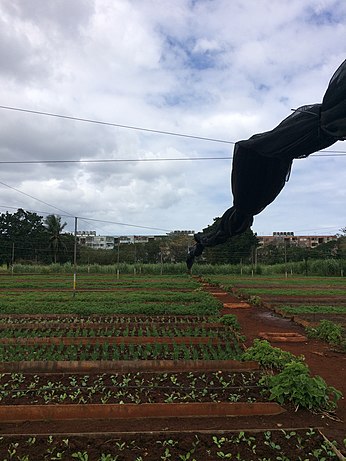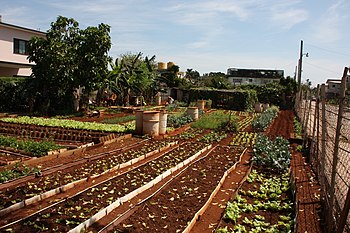Organopónicos - Wikipedia
Organopónicos
From Wikipedia, the free encyclopedia
(Redirected from Organopónico)
Jump to navigationJump to search

Produce and flowers from a Cuban organopónico

Crop rows at Alamar Organic Farm in Havana. Many organoponics have been developed in urban environments, as seen by the city-scape in the background.
Organopónicos or organoponics is a system of urban agriculture using organic gardens. It originated in Cuba and is still mostly focused there. It often consists of low-level concrete walls filled with organic matter and soil, with lines of drip irrigation laid on the surface of the growing media. Organopónicos is a labour-intensive form of localagriculture.
Organopónico farmers employ a wide variety of agroecological techniques including integrated pest management, polyculture, and crop rotation. Most organic materials are also produced within the gardens through composting. This allows production to take place with few petroleum-based inputs.[1]
Organopónicos first arose as a community response to lack of food security during the Special Period after the collapse of the Soviet Union. It is publicly functioning in terms of ownership, access, and management, but heavily subsidized and supported by the Cuban government.
Contents
Background[edit]
During the Cold War, the Cuban economy relied heavily on support from the Soviet Union. In exchange for sugar, Cuba received subsidized petroleum, petroleum products, agrochemicals (such as fertilizers and pesticides), and other farm products. Moreover, approximately 50% of Cuba's food was imported. Cuba's food production was organized around Soviet-style, large-scale, industrial agricultural collectives.[2] Before the collapse of the Soviet Union, Cuba used more than 1 million tons of synthetic fertilizers and up to 35,000 tons of herbicides and pesticides per year.[2]
With the collapse of the USSR, Cuba lost its main trading partner and the favorable trade subsidies it received, as well as access to oil, chemical fertilizers, pesticides etc. From 1989 to 1993, the Cuban economy contracted by 35%; foreign trade dropped 75%.[2]Without Soviet aid, domestic agriculture production fell by half. This time, called in Cuba the Special Period, food scarcities became acute. The average per capita calorie intake fell from 2,900 a day in 1989 to 1,800 calories in 1995. Protein consumption plummeted 40%.[2]
Without food, Cubans had to learn to start growing their own food rather than importing it. This was done through small private farms and thousands of pocket-sized urban market gardens—and, lacking chemicals and fertilizers, food became de facto organic.[3]Thousands of new urban individual farmers called parceleros (for their parcelas, or plots) emerged. They formed and developed farmer cooperatives and farmers markets. These urban farmers found the support of the Cuban Ministry of Agriculture (MINAGRI), who provided university experts to train volunteers with organic pesticides and beneficial insects.
Without artificial fertilizers, hydroponic equipment from the Soviet Union was no longer usable. Instead, they were converted for the use of organic gardening. The original hydroponic units, long cement planting troughs and raised metal containers, were filled with composted sugar waste, thus turning hydroponicos ("hydroponics") into organopónicos.
The rapid expansion of urban agriculture in the early 1990s included the colonization of vacant land both by community and commercial groups. In Havana, organopónicos were created in vacant lots, old parking lots, abandoned building sites and even spaces between roads.
Current status[edit]

Havana small farm
More than 35,000 hectares (over 87,000 acres) of land are being used in urban agriculture in Havana alone.[4]
Havana produces enough food for each resident to receive a daily serving of 280 grams (9.88 ounces) of fruits and vegetables. The urban agricultural workforce in Havana has grown from 9,000 in 1999 to 23,000 in 2001 and more than 44,000 in 2006.[4] However, Cuba still has food rationing for basic staples. Approximately 69% of these rationed basic staples (wheat, vegetable oils, rice, etc.) are imported.[5] Overall, however, approximately 16% of food is imported from abroad.[5]
The structures of organopónicos vary from garden to garden. Some are run by state employees, others are run cooperatively by the gardeners themselves. The reliance on the state government cannot be overlooked. The government provides community farmers with the land and the water, and sells key materials such as organic compost, seeds, irrigation parts, and organic pesticides called "biocontrols" in the form of beneficial insectsand plant-based oils. These biological pest and disease controls are produced in some 200 government centers across the country.[2] All garden crops such as beans, tomatoes, bananas, lettuce, okra, eggplant and taro are grown intensively within Havana using only organic methods, the only methods permitted in the urban parts of Havana. No chemicals are used in 68% of Cuban corn, 96% of cassava, 72% of coffee and 40% of bananas. Between 1998 and 2001, chemicals were reduced by 60% in potatoes, 89% in tomatoes, 28% in onion and 43% in tobacco.[4]
By 1999, some farmers could have black beans, rice, tomato or even a boiled potato to eat; this is impressive by Cuban standards.[6]
Despite the successes of organoponics, efforts of the Cuban government have been negatively evaluated by some authors. A 2012 article in the free-market oriented magazine The Economist stated:
The grip of the state on Cuban farming has been disastrous. State farms of various kinds hold 75% of Cuba's 6.7m hectares of agricultural land. In 2007 some 45% of this was lying idle, much of it overrun by marabú, a tenacious weed. Cuba is the only country in Latin America where killing a cow is a crime (and eating beef a rare luxury). That has not stopped the cattle herd declining from 7m in 1967 to 4m in 2011.
— The Economist
The same article claimed that As of 2012, there were plans to privatise farming and dismantle organopónicos, as part of broader plans to improve productivity.[7]
Applicability beyond Cuba[edit]
In Venezuela, the socialist government is trying to introduce urban agriculture to the populace.[8] In Caracas, the government has launched Organoponico Bolivar I, a pilot program to bring organopónicos to Venezuela. Urban agriculture has not been embraced in Caracas.[8] Unlike Cuba, where organopónicos arose from the bottom-up out of necessity, the Venezuelan organopónicos are a top-down initiative based on Cuba's success. Another problem for urban agriculture in Venezuela is the pollution in major urban areas. At the Organoponico Bolivar I, a technician reads a pollution meter in the garden every 15 days.[8]
See also[edit]
Allotment gardens
Community Supported Agriculture
CPA (Agriculture)
Food security
Garden sharing
Guerrilla gardening
List of community gardens
Sustainability
UBPC
Urban gardening (disambiguation)
Urban horticulture
hide
v
t
e
Hydroculture
Types
Aeroponics
Aquaponics
Aquascaping
Hydroponics
passive
Subtypes
Aquatic garden
Bottle garden
Deep water culture
Ebb and flow
Fogponics
Microponics
Nutrient film technique
Organic hydroponics
Organopónicos
Sub-irrigated planter
Top drip
Substrates
Charcoal
Coco peat
Diatomaceous earth
Expanded clay aggregate
Gravel
Growstones
Lava rock
Mineral wool
Perlite
Pumice
Rice hulls
Sand
Vermiculite
Wood fibre
Accessories
Grow light
Hydroponic dosers
Irrigation sprinkler
Leaf sensor
Net-pot
Spray nozzle
Timers
Ultrasonic hydroponic fogger
Water chiller
Related concepts
Algaculture
Aquaculture of coral
Aquaculture of sea sponges
Controlled-environment agriculture
Historical hydroculture
Hydroponicum
Paludarium
Plant nutrition
Plant propagation
Rhizosphere
Root rot
Vertical farming
Water aeration
 Commons
Commons Wikibooks
Wikibooks Wikiversity
WikiversityReferences[edit]
- ^ Cederlöf, Gustav (2016). "Low-carbon food supply: The ecological geography of Cuban urban agriculture and agroecological theory". Agriculture and Human Values. 33 (4): 771–784. doi:10.1007/s10460-015-9659-y.
- ^ Jump up to:a b c d e Mark, Jason (Spring 2007). "Growing it Alone". Earth Island Institute. Retrieved 2010-05-18.
- ^ Buncombe, Andrew (August 8, 2006). "The good life in Havana: Cuba's green revolution". The Independent. London: Independent Print Limited. Retrieved 2010-05-18.
- ^ Jump up to:a b c Knoot, Sinan (January 2009). "The Urban Agriculture of Havana". Monthly Review. Monthly Review Foundation. 60: 44–63. Retrieved 2010-05-18.
- ^ Jump up to:a b "The Paradox of Cuban Agriculture". Monthly Review.
- ^ "Fidel’s sustainable farmers". The Economist. 1999-04-24. Retrieved 17 September2012.
- ^ "The Castros, Cuba and America: On the road towards capitalism". The Economist. 2012-03-24. Retrieved 17 September 2012.
- ^ Jump up to:a b c Howard, April (2006). "How Green Is That Garden?". E - The Environmental Magazine. Earth Action Network, Inc. 17: 18–20. Archived from the original on 2008-05-09. Retrieved 2010-05-18.
External links[edit]
Urban Agriculture in Cuba (Photo Essay), Noah Friedman-Rudovsky, Oct 18 2012, NACLA.org
"The Urban Agriculture of Havana," Monthly Review, 2009-Jan
Case Study in Urban Agriculture: Organiponicos in Cienfuegos, Cuba
Garden Activist: Cuba's Second Revolution
The Growing Success of Organoponicos, Greenhouse Canada, by Gary Jones
Changes on the Horizon for Cuba's Sustainable Agriculture
Eat Local: Cuba's Urban Gardens Raise Food on Zero Emission
Greg Morsbach Cuba's organic revolution BBC, June 27, 2001.
Food Photography: Organic Agriculture in Cuba
Bill McKibben The Cuba diet: What will you be eating when the revolution comes?Harper's Magazine April 1995.
Esteban Israel In "eat local" movement, Cuba is years ahead Reuters, December 15, 2008.
Andrew Buncombe The good life in Havana: Cuba's green revolution The Independent 8 August 2006
Scott G. Chaplowe Havana's Popular Gardens: Sustainable Urban Agriculture, WSAA Newsletter, Fall 1996, Vol. 5, No. 22. Reprinted at cityfarmer.org




